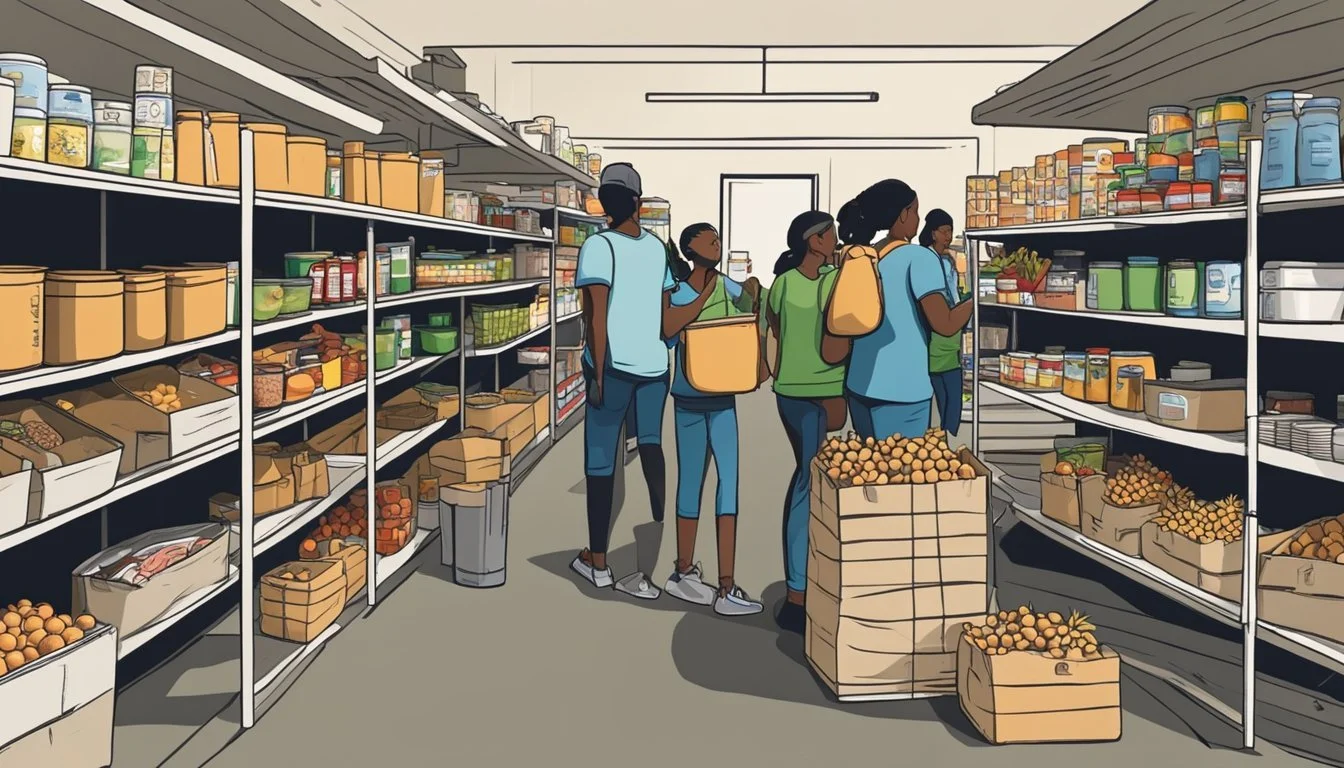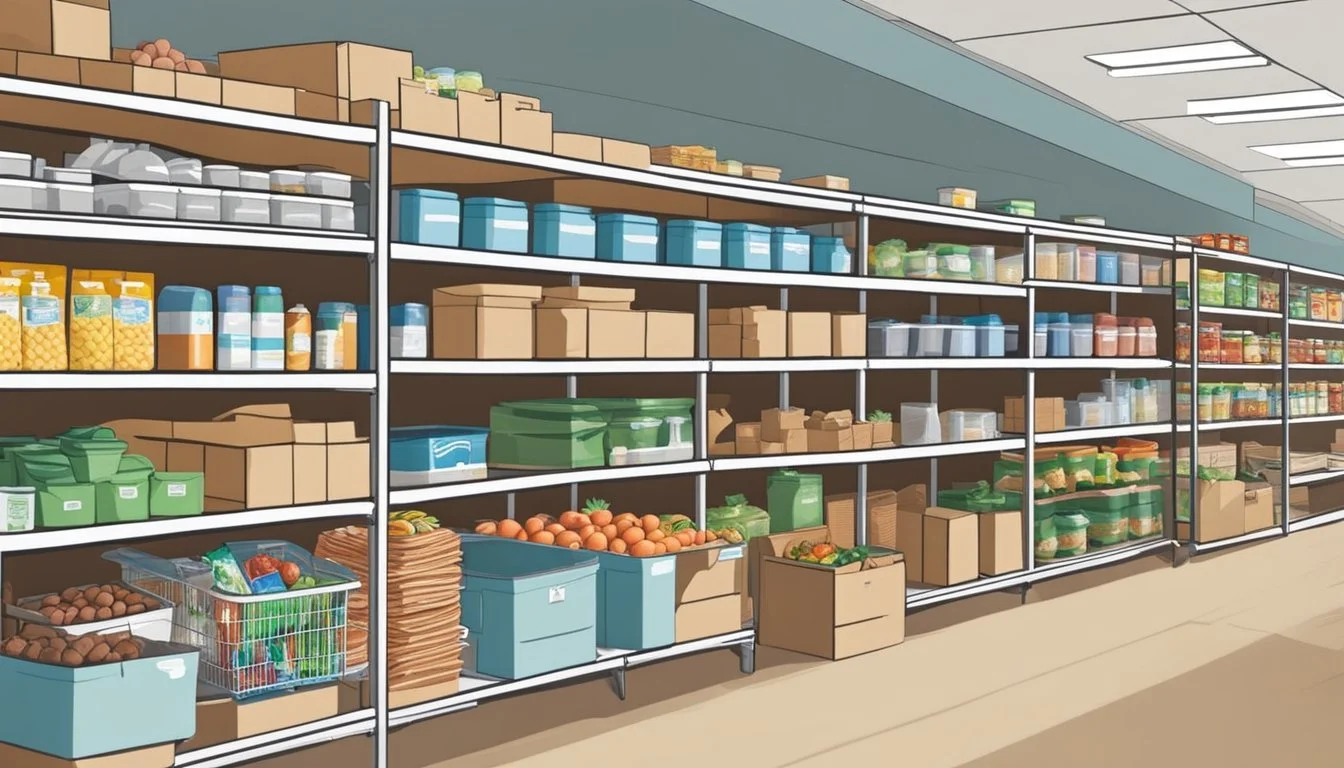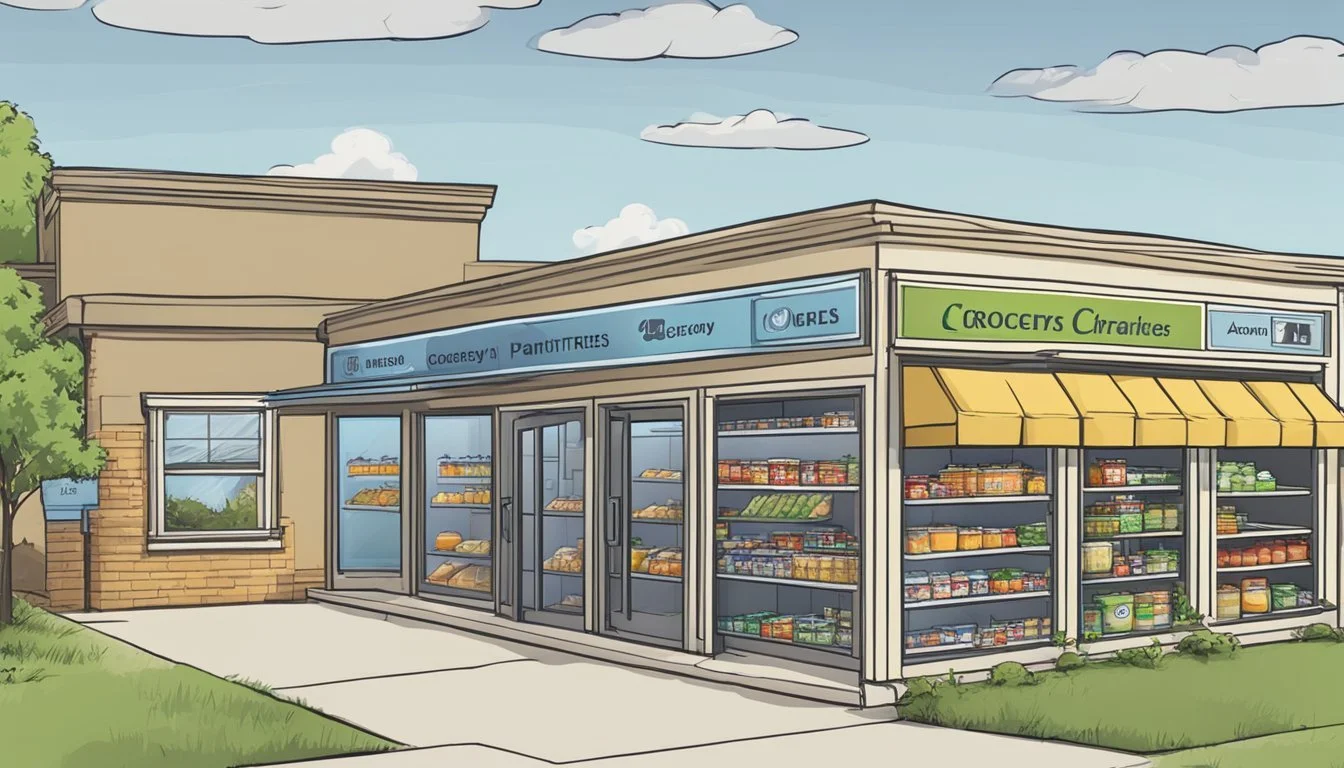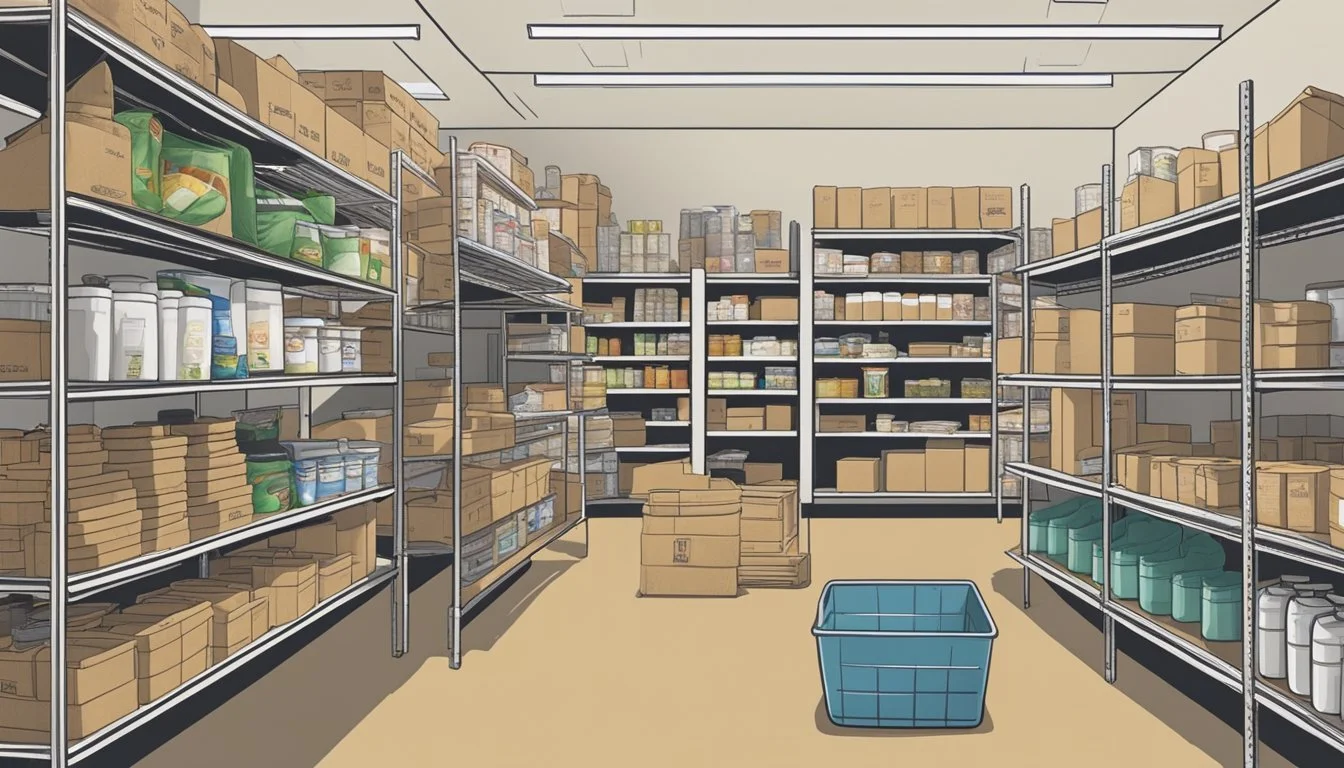Free Groceries and Food Pantries in Coryell County, Texas
Your Ultimate Guide
This Article is Part of Our Guide on Free Groceries in Texas
Coryell County, Texas, addressing food security within its community, offers a network of food pantries and assistance programs. These pantries provide an essential service to residents, ensuring access to free groceries and nutritional support. The food assistance services operate across the county and are designed to help individuals and families who find themselves facing hardship. They work to not only alleviate immediate hunger but also to foster long-term stability for those they serve.
Several food pantries in Coryell County have adapted to their patrons' needs with schedules that cater to a variety of circumstances, such as offering different days and hours of operation. These include weekday and Saturday distributions, aimed at accommodating those who may have work commitments during traditional hours. By providing such flexible access, the county's food pantries ensure that those in need can receive assistance at times that best suit them.
In addition to standard food pantry operations, mobile food pantry services extend the reach of food assistance throughout the county, traveling to various locations to serve a larger segment of the community. Through collaboration with food banks and other non-profits, these pantries support a diverse range of individuals, including seniors and families, and underscore the community’s commitment to combatting food insecurity.
Understanding Food Insecurity in Coryell County
In Coryell County, Texas, the picturesque landscape masks a stark reality: a significant number of residents face the daily challenge of food insecurity. This section explores the multi-faceted issue of hunger and its impact on the local community.
Key Factors Contributing to Hunger
The prevalence of hunger in Coryell County results from several interrelated factors. Economic instability, often due to unemployment or underemployment, prevents many from accessing sufficient nutritious food. Low-income families, particularly those with a single income source, are at higher risk of experiencing food insecurity. Additionally, logistical challenges such as the lack of transportation can limit access to food resources.
Demographic considerations further compound these issues. Coryell County's population includes children, the elderly, and immigrants, each group vulnerable in unique ways. Children require proper nutrition for development, while elderly residents may have limited mobility and fixed incomes that constrain their food choices. Immigrants can face language barriers and unfamiliarity with local assistance programs, contributing to their vulnerability.
Impact on Vulnerable Populations
The consequences of food insecurity among vulnerable populations in Coryell County are far-reaching.
Children: Hunger can impede cognitive development and academic performance, setting back educational outcomes.
Elderly: For the elderly, a lack of adequate nutrition can exacerbate health issues and decrease the quality of life.
Unemployed: The stress of food insecurity on unemployed individuals can lead to a cycle of poverty, making re-entry into the workforce more challenging.
Immigrants: Immigrants may struggle to navigate assistance programs or face cultural barriers that prevent them from seeking help.
Community food assistance programs and pantries in Coryell County aim to address these specific needs. With services adapted to assist a diverse demographic, including phone lines with multilingual support and various distribution times to accommodate different schedules, these programs are a lifeline for those affected by food scarcity.
Types of Food Assistance Programs
In Coryell County, Texas, residents benefit from a variety of food assistance programs designed to provide nutritional support to those in need. These programs range from federal and state support to local community-driven services, ensuring a network of resources is available.
Federal and State Support
The residents of Coryell County have access to both federal and state assistance programs that help mitigate food insecurity. These programs often collaborate with local agencies to distribute resources effectively.
Supplemental Nutrition Assistance Program (SNAP)
SNAP benefits, formerly known as food stamps, serve as a cornerstone in providing financial assistance for groceries. Eligible residents of Coryell County can utilize these benefits to purchase food items at participating stores, helping households maintain a balanced diet.
Eligibility: Determined by income and household size.
Benefits: Vary based on need; used via EBT cards.
Women, Infants, and Children (WIC)
The WIC program focuses on the well-being of pregnant women, breastfeeding mothers, infants, and children under the age of five. This special supplemental nutrition program offers:
Nutritional education and support.
Health care and social service referrals.
Access to nutritious foods to promote good health during critical growth periods.
Local Soup Kitchens and Meal Programs
Coryell County supports its residents through local soup kitchens and meal programs, often run by community organizations and faith-based groups. These programs provide:
Soup kitchens: Hot meals served on-site to individuals and families.
Meals on Wheels: Delivery of meals to the elderly and homebound.
Finding Food Banks and Pantries
In Coryell County, Texas, residents in need have several options for accessing free food and groceries through a network of food banks, pantries, and distribution programs.
State and Central Texas Food Bank Network
The Central Texas Food Bank is a key resource that serves residents throughout the region, including Coryell County. They operate in partnership with local food pantries to ensure that those in need have access to nutritious food. For residents requiring assistance in applying for SNAP benefits, the Central Texas Food Bank provides support and guidance.
Local Community Churches and Charities
Various community churches and charities work hand-in-hand with food banks to distribute food to individuals and families facing hunger. These local organizations typically understand their communities well and can offer personalized support along with pantry services.
Mobile Pantries and Drive-Thru Distributions
Mobile food pantries and drive-thru distributions make accessing food convenient. These programs allow individuals to receive pre-packed groceries and fresh produce directly to their vehicles, thereby maintaining privacy and reducing the barrier to access.
Operating Hours and Contact Information
It is important for individuals seeking assistance to be aware of operating hours and contact information. Each food pantry and distribution center may operate on different schedules. To find the most accurate hours and get in contact with the nearest food assistance program, individuals are advised to dial 2-1-1 or call toll-free at 877-541-7905 for multilingual assistance and TDD access. For locations and specific details about programs such as the Emergency Food Assistance Program (TEFAP), the Central Texas Food Bank hotline at 855-366-3401 can be called.
What to Expect When Visiting Food Pantries
When visiting food pantries in Coryell County, Texas, individuals can expect a structured system designed to provide essential groceries efficiently. Eligibility criteria and the type of assistance available are clearly defined to ensure those in need receive help promptly.
Documentation and Eligibility
To access services at food pantries, individuals may need to present documentation proving their residence in Coryell County. Pantries will typically ask for an address verification, such as a utility bill or a driver's license. Some pantries also require proof of income to ensure aid is given to those who qualify based on their financial situation.
Types of Food and Items Available
Most food pantries offer a range of items tailored to meet basic nutritional needs. This includes:
Shelf-stable groceries: Rice, pasta, and canned goods.
Dairy products: Milk and cheese, subject to availability.
Fresh produce: Seasonal fruits and vegetables, sourced to support a balanced diet.
Process of Receiving Assistance
Individuals seeking assistance will usually follow a sequence:
Arrival: Upon arrival at the food pantry, they may need to sign in and present the required documents.
Food Selection: Depending on the pantry's setup, individuals may receive pre-packed boxes or have the opportunity to select food items similar to a traditional grocery store.
Distribution: Volunteers generally assist with the distribution, neatly organizing groceries for easy transportation.
Food pantries strive to support their communities with dignity and efficiency, so recipients can expect a respectful and orderly experience.
How to Access Emergency Food Services
For those in need in Coryell County, Texas, there are several avenues to obtain emergency food assistance quickly and efficiently. In a community where support is paramount, individuals and families facing hardship can benefit from immediate assistance, program referrals, and specialized support tailored to displaced families' needs.
Immediate Food Assistance
Individuals can receive free groceries and meals without delay by visiting local food pantries and community kitchens. Coryell County residents may contact 211 Texas, a free service that helps Texans connect with resources for food, housing, and more. One can also call the USDA National Hunger Hotline at 1-866-3-HUNGRY to locate nearby food assistance services.
Referrals and Emergency Programs
In addition to immediate services, residents have access to various assistance programs. The Emergency Food Assistance Program (TEFAP) offers support to those with low income, administering emergency food at no cost. Applications for TEFAP and other federal aid programs, such as SNAP benefits, can often be made through local agencies or online, ensuring comprehensive aid coverage.
Specialized Support for Displaced Families
Displaced families in Coryell County may find specific resources tailored to their situation. Agencies provide support services such as temporary shelter food assistance and ensure these families receive the necessary referrals to long-term aid programs. For families seeking such specialized assistance, reaching out to local shelters and non-profits like Feeding America can be an effective first step.
Additional Services and Resources
In addition to food pantries, Coryell County offers various essential services for residents in need. These resources range from financial assistance for housing and utility bills to health services and programs for clothing and toiletries.
Housing and Utility Assistance
Residents facing financial hardships may seek support through the Hill Country Community Action Association, Inc. This association provides programs to assist with rent and may offer temporary shelter. Utility bill support for essentials like heat, electricity, and even internet costs is also accessible. Interested parties can contact the association directly at (325) 372-5167 to apply for assistance.
Health Services and Free Clinics
Coryell County has health service options for those without insurance or with limited financial resources. Free clinics operate to ensure that individuals can receive medical attention regardless of their ability to pay. These clinics can offer both preventative and emergency health services, benefacting a broad range of the community's healthcare needs.
Clothing Closets and Toiletry Programs
Organizations in the county operate clothing closets which offer free clothing to individuals and families in need. Alongside these, Helping Hands Food Pantry and similar entities include programs to provide personal care items and toiletries at no cost. These programs are established to respect and attend to the dignity and personal hygiene of all community members, with no discrimination based on religion or belief.
How to Get Involved and Help
Community members can play a crucial role in alleviating hunger in Coryell County, Texas, through active participation in local food assistance initiatives. Involvement ranges from contributing time and effort, making financial or food donations, to engaging in advocacy.
Volunteering at Local Food Pantries
One can serve their community by volunteering at food pantries. Volunteers are the backbone of these organizations, helping to sort, pack, and distribute food to those in need. Interested individuals should contact their nearest food pantry for volunteer opportunities, where they'll receive training to assist effectively.
Where Volunteers are Needed:
Sorting Donated Food: Ensuring that donations are sorted according to type and expiration date.
Food Distribution: Assisting in the setup and operation of food distribution, including drive-thru pantries.
Administrative Support: Helping with check-ins and data entry to keep operations running smoothly.
Donating Food and Funds
Donations, whether food or monetary, are essential for sustaining the operational capabilities of food pantries. As 501(c)(3) non-profit organizations, donations to food pantries are typically tax-deductible.
How to Donate:
Food Donations: Non-perishable food items can be dropped off directly at local pantries. High-demand items include canned goods, whole grains, and peanut butter. Ensure the food is within its use-by date.
Financial Contributions: Monetary donations provide pantries with the flexibility to purchase needed food items at lower costs through partnerships with food banks.
Raising Awareness and Advocacy
Advocacy and raising awareness are vital in building a supportive community for food security initiatives. By informing others of the impact of hunger in Coryell County, the community can mobilize to support local programs.
Actions for Advocacy:
Educate: Share facts and statistics about food insecurity in the area.
Engage: Encourage community groups and local businesses to get involved in the fight against hunger.
Influence: Reach out to local officials to advocate for policies that support food assistance programs and the overall mission of non-profit organizations fighting hunger.
Special Considerations During COVID-19
In Coryell County, Texas, food pantries faced specific challenges amid the COVID-19 pandemic. Ensuring the safety of staff, volunteers, and clients while addressing the surge in demand required strategic planning and community support.
Safety Protocols at Food Pantries
Food pantries implemented stringent safety measures to prevent the spread of the coronavirus. They required staff and volunteers to regularly wash their hands with soap and water for at least 20 seconds. Where handwashing facilities were not available, hand sanitizers with at least 60% alcohol were used. Additionally, the use of PPE, like masks and gloves, became standard, especially during food packaging and distribution processes.
Increased Demand and Resource Allocation
The pandemic resulted in an unprecedented increase in demand for food assistance. Food pantries in Coryell County adapted by modifying their resource allocation to ensure sustainability. They undertook efforts like pre-packaging food items and setting up drive-thru distributions to manage the increase efficiently and safely. These adjustments allowed pantries to serve their communities without compromising safety standards.
Support for the Unemployed and Quarantined
To support individuals who lost their jobs or were quarantined due to COVID-19, food pantries expanded their services. Partnerships with local agencies and volunteers were crucial in reaching these groups. Food pantries also provided centralized information sources, such as online platforms or common phone numbers like 211, to help those in need to access food resources during tough times.
Concluding Resources
In Coryell County, Texas, residents have a robust support system through various food pantries and assistance programs. These resources provide essential aid to those in need, offering groceries, meal programs, and guidance for navigating available food assistance.
Comprehensive List of Food Pantries
Coryell County offers a network of food pantries, ensuring that regardless of one’s location within the county, access to food assistance is within reach. Organized volunteer operations like Helping Hands Food Pantry provide a substantial supply of groceries, assisting residents without discrimination based on religious beliefs.
Notable Food Pantries in Coryell County:
Helping Hands Food Pantry
Mobile Food Pantry Truck serving multiple counties
Guides for Navigating Food Assistance
Individuals seeking food assistance in Coryell County can access detailed guides that outline the process of obtaining help. These guides are designed to streamline the experience, pointing to the various programs available for women, families, and individuals struggling to make ends meet.
Key Guides Available:
How to Apply for Food Assistance
Grant and Loan Programs for Temporary Relief
Contact Directories for Immediate Help
For immediate food assistance needs, contact directories provide information on local pantries, soup kitchens, and emergency food services. The Capital Area Food Bank of Texas, among others, offers an extensive directory that residents can utilize to connect with the needed support without delay.
Important Contact Information:
Capital Area Food Bank of Texas: 800-786-2616 (toll free) or 512-282-2111
Local Emergency Food Assistance Hotlines
Residents of Coryell County benefit from these comprehensive and accessible resources, guiding them during times of need with the fundamental support of sustenance.











